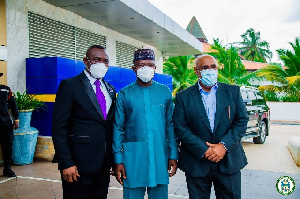 Kenneth Owusu, others in a group picture
Kenneth Owusu, others in a group picture
A diagnostic review of the economic resilience of Accra has revealed that the local economy of Ghana’s national capital is sound and possesses the capacity to moderately withstand and suppress the impact of the COVID-19 pandemic and recover.
The findings of the study conducted by the United Nations Economic Commission For Africa (UNECA) in collaboration with the Accra Metropolitan Assembly (AMA), indicated that the economy of Accra was strong and resilience, especially in the areas of local financial market environment, local economic governance, as well as basic service infrastructure and connectivity.
Kenneth Owusu, a local consultant on the project, disclosed this on Wednesday when he presented highlights of the key findings at a two-day stakeholders’ workshop on Developing an Economic Recovery and Resilience Plan (ERRP) for Accra.
The Accra Diagnostic Report, which covers five main pillars of economic resilience: Resilience of Local Business Environment, Resilience of the Local Labour Market, Resilience of The Local Financial Systems, Resilience of Economic Governance, Resilience of Basic Local Infrastructure and Connectivity, was based on global indicators agreed with UNECA and was conducted between November 2020 to April 2021.
“Overall, the local economy of Accra was rated as “B” on the five points global economic and financial resilience framework…Out of 17 assessment areas, the City of Accra was graded “B” in 14 areas: “C+” in one area, “C” in one area and “D” in one area,” he said.
He noted that the labour market in Accra was characterised as moderately flexible with relative labour mobility adding that significant weaknesses were observed in the area of social protection of labour with informal sector operators being highly disadvantaged.
“Labour market flexibility and labour mobility indicators were rated B+, while social protection of labour was assessed as “D”,” he said.
He also pointed out that weaknesses existed in the area of “size and depth of the financial system” which was deemed to have average resilience with a moderate capacity to mitigate the impact of the pandemic and will relatively take a reasonable length of time to recover.
Some key recommendations in the report on the resilience of the business environment, he said, include improving the productivity of the informal sector by building operational capacities through regular training, linking the informal sector to the formal sector through the Accra Resilience Strategy and incorporating sub-contracting requirements in the award of the City’s contracts as well as improving access to affordable financing especially by Small and Medium Term Enterprises (SME’s).
“Recommendations made on the resilience of the financial system also include improving financial literacy, especially among informal sector operators, introducing modern approaches to further enhance internal revenue mobilisation capacity, leveraging on innovative funding approaches such as Municipal bonds, PPPs and Sister City programmes and deliberate policy to go into investment,” he said.
“On the resilience of the labour market, key recommendation includes strengthening social protection and improving social protection expenditure through the institutionalisation of life-long training and re-training programmes, especially for their staff,” he added.
Metropolitan Chief Executive of Accra, Mohammed Adjei Sowah in a remark said the objective of the review was to inform local authorities about the impact of COVID-19 on their economic and financial resilience, the capacity to build their economies and where to prioritise new policy and development actions.
He emphasised the need to align the Accra Economic Recovery And Resilience Plan (ERRP) with Ghana CARES “Obaatanpa” Programme of the Ministry Of Finance to generate greater synergies and ensure an accelerated impact of the Ghana CARES “Obaatanpa” Programme in stimulating Accra’s economic recovery.